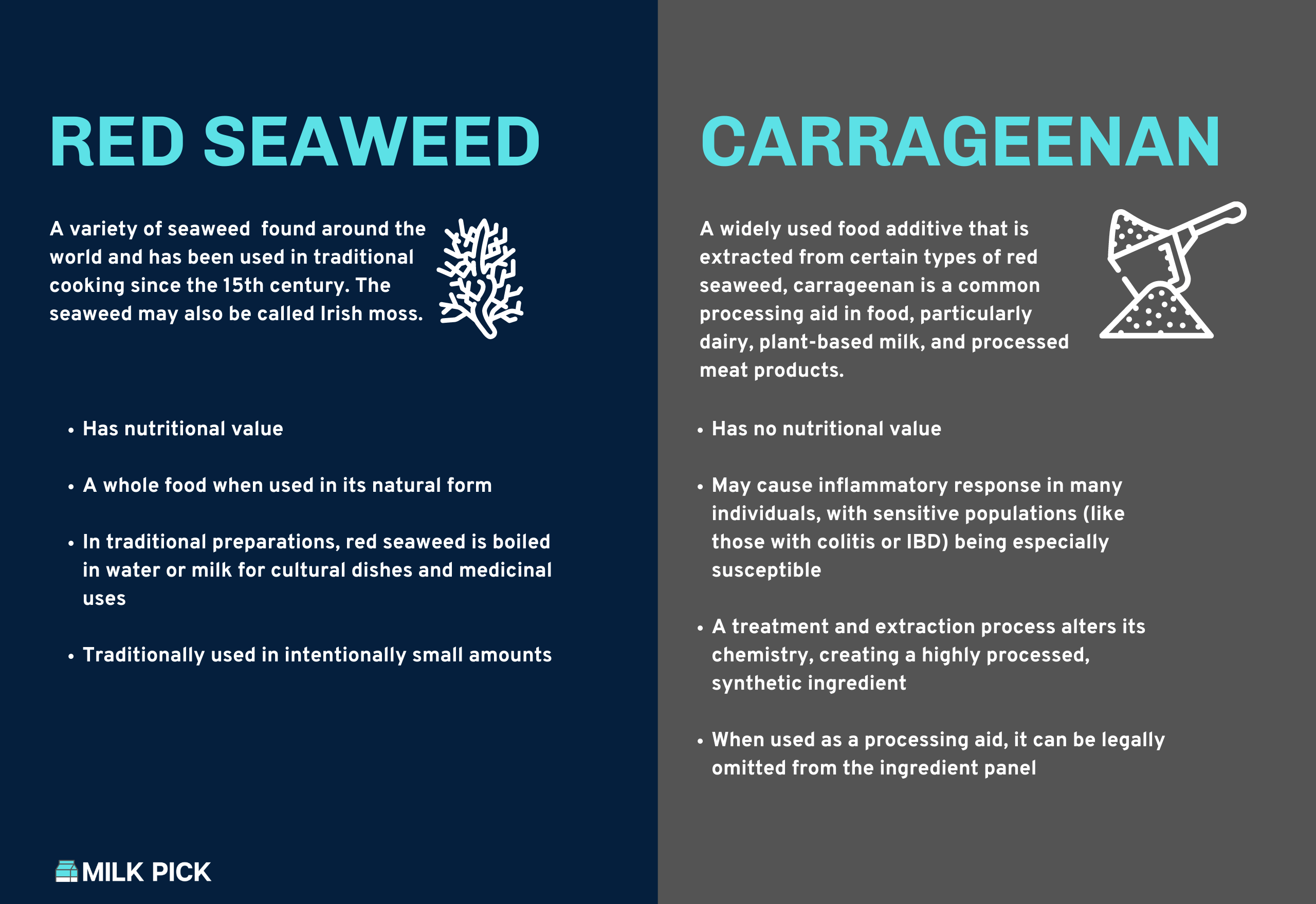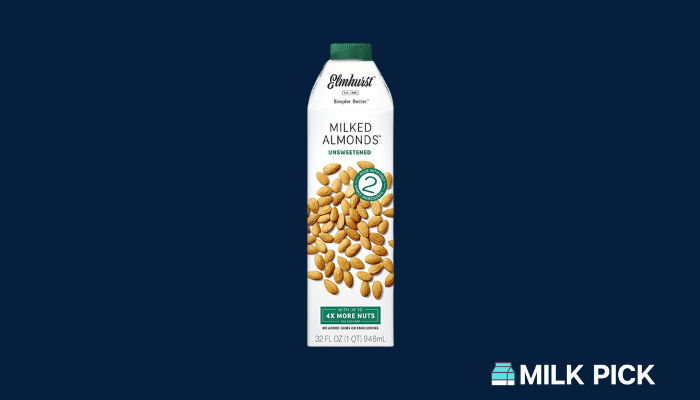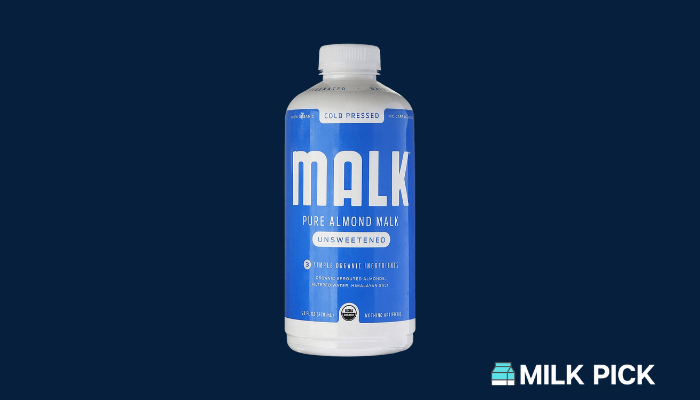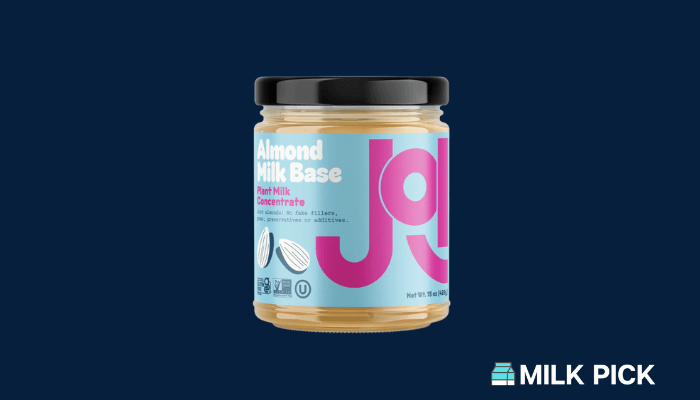Turn your almond milk package around and look at the listed ingredients. There’s a high chance sunflower lecithin is present, but for exactly what purpose?
Sunflower lecithin is a plant-derived emulsifier—a kind of substance that forcibly binds oil and water in almond milk. Adding it into the mix results in a creamier and smoother texture.
While almond milk doesn’t typically have an oil-based ingredient, it does contain natural fats that mix better with water.
Ready to learn more about sunflower lecithin and why it's in your almond milk? Let’s jump into the article.
What Is Sunflower Lecithin?
Sunflower lecithin is a subtly-flavored ingredient that serves as a binding agent for oil and water. It works by suspending the fats in almonds more stably in the base. The more thorough the blend, the creamier the milk.
Plain almond milk can taste bland and feel watery, which is one of the reasons various brands choose to use the additive in their products.
It can also provide you with high levels of choline, a nutrient good for your heart, memory, and metabolism.
Almond milk doesn’t really need sunflower lecithin. In fact, you can prepare a homemade serving with just organic almonds and water.
In terms of manufacturing, the additive may be an attractive feature (or not) with its supposed health benefits and allergen-free nature.
What Is Sunflower Lecithin Made From?
Sunflower lecithin is derived from the gum extracted from dehydrated sunflowers.
This gum is processed using a cold press system, then powdered for easier storage, stability, and flexible usage in the food industry.
Since it’s purely sourced from plants, sunflower lecithin is vegan—at least in its role as an almond milk additive.
Sunflower lecithin can also be made as supplement capsules, and it may be mixed with non-vegan ingredients like gelatin and glycerine.
The Difference Between Sunflower Lecithin and Soy Lecithin
Soy lecithin is closely related to sunflower lecithin since it’s also an emulsifying food additive commonly used in the industry.
Due to the drive to remove the word “allergens” or similar warnings in the milk packaging, manufacturers typically avoid it even if it’s cheaper.
Most soybeans are also genetically-modified, which is a big red flag in terms of healthy consumption.
People value the production process of what goes into their bellies, and they’re likely to avoid products that contain GMOs.
From this point alone, it’s no surprise that sunflower lecithin is more common in your almond milk.
Why Is Sunflower Lecithin in Almond Milk?
Almonds and water are the only ingredients you need in your almond milk, but they tend to split up over time. Sunflower lecithin suspends the almond fats in the water, which keeps them from separating.
Imagine pouring yourself a glass of almond milk and what comes out of the packaging is a semi-transparent watery mixture.
One of the first things that might come into your mind is that it’s spoiled.
This is pretty easy to solve. You just need to give it a shake to blend the mixture into a smooth texture.
However, it’s a no-no from a business aspect.
This is why various brands use many kinds of emulsifiers, including sunflower lecithin, carrageenan, and gellan gum.

What Causes Almond Milk To Separate?
The separation of almond milk into part cream and part water is commonly referred to as curdling, and it has to do with the protein structure of the milk.
You should know that the proteins in almond milk easily separate, especially when heat is added.
Curdling almost always happens to almond milk, which is more particular to those made at home. Sunflower lecithin only prevents its early occurrence.
It should be safe to consume as long as it doesn’t have a bad smell, color change, or clumpy texture.
Sunflower Lecithin Versus Carrageenan and Other Emulsifiers
Sunflower lecithin is only one of the many options that almond milk manufacturers can choose from. Here’s a brief list of other emulsifying additives you might find in your almond milk.
- Soy lecithin
- Carrageenan
- Gellan gum
- Guar gum
Among the list of almond milk emulsifiers, carrageenan is a controversial ingredient.
While FDA-approved, it’s linked to various health problems like inflammation, colon cancer, bloating, and allergic reactions. But, there’s no conclusive evidence to support these claims.

Gums are not preferred because of their high level of processing.
They’re used to thicken the almond milk since the amount of almonds present is low. Meanwhile, soy lecithin may trigger allergies among consumers.
Sunflower lecithin seems to be one of the safer emulsifiers to use. It’s allergen-free, vegan, plant-based, and rich in choline.
However, sticking with almond milk that contains none of these additives is generally less risky to your health.
Should You Avoid Sunflower Lecithin?
Although sunflower lecithin seems to offer some advantages, taking some precautions before consuming it is necessary.
If you consume sunflower lecithin in high amounts, you could suffer from diarrhea, stomach pain, bloating, increased salivation, and nausea.
Sunflower lecithin is known to aid in breastfeeding by helping prevent clogged milk ducts.
The Canadian Breastfeeding Foundation recommends its consumption, but consulting your healthcare professional first would be for the best.
Generally, your daily consumption of any kind of lecithin should be within 5000 mg.
Best Almond Milk Without Sunflower Lecithin
Choosing brands that stick to the basics will always be the safest way to enjoy your cup of almond milk. Here are some recommendations that you can try.
1. Elmhurst
Elmhurst uses four times as many almonds and nuts as other brands, which makes their milk thick and creamy without any emulsifying or thickening agents.
Unsweetened almond milk crafted from plain almonds and filtered water makes Elmhurst a perfect fit for people on their weight-loss journey.
It’s non-GMO, nutrient-rich, and additive-free—just pure almond milk.

2. Malk
Compared to non-genetically modified products, organic ingredients are a notch higher. Malk’s almond milk is USDA-certified organic, made with pesticide-free and GMO-free almonds.
Mixed with Himalayan pink salt, Malk milk is shelf-stable and free from artificial additives, making it one of the healthiest choices you have.

3. JOI
JOI’s almond milk base is probably one of the most unique in terms of preparation. You need to mix it first with water.
The best thing about JOI milk base is that it lasts long—even without refrigeration.

4. Homemade Almond Milk
Homemade almond milk remains one of the best to consume. You get to ensure that its preparation is clean, and you control how many almonds to include in your recipe.
Plus, you can experiment with the flavor and sweetness of your milk. You may refer to one of our guides for making your almond milk at home.
Instead of Almond Milk, Get Healthy Lecithin From Food
Natural lecithin from food is harmless, which proves that getting it from your diet in balanced amounts is better.
Although sunflower lecithin in almond milk should pose minimal health risks, it still counts as an additive.
Lecithin is beneficial in maintaining good cholesterol, aiding breastfeeding, and improving digestion. That’s why it would be no surprise if you want to add it to your daily nutrient consumption.
Some natural sources of lecithin include:
- Black beans
- Dairy
- Egg yolk
- Kidney beans
- Red meat
- Seafood
- Soybeans
Is Almond Milk Without Sunflower Lecithin Healthy?
Commercial almond milk may contain other substances besides sunflower lecithin, so it’s still up for debate whether it’s healthy.
Generally, the milk is better for you if it’s free from:
- Added sugars
- Any kind of lecithin
- Carrageenan
- Thickeners like gellan gum
You want your almond milk to be unsweetened to avoid unplanned sugar intake.
Choosing one formulated with low sodium content and a high number of almond nuts is also recommended.
More almonds mean thicker and creamier milk—therefore, it won’t need sunflower lecithin, thickeners, and other additives.
Plain Organic Almond Milk Is Your Best Option
Whether sunflower lecithin is good or bad depends on your consumption amount. If you overindulge, you may suffer from diarrhea, stomach pain, and similar effects.
Almond milk is preferably made with only two ingredients: almonds and water. The simpler the formulation is, the fewer health risks you’re exposed to.
While many commercial brands like to add thickeners and emulsifiers to their products, there are a plenty that don't. You should try making it yourself too!
